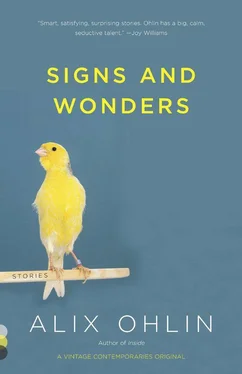Alix Ohlin - Signs and Wonders
Здесь есть возможность читать онлайн «Alix Ohlin - Signs and Wonders» весь текст электронной книги совершенно бесплатно (целиком полную версию без сокращений). В некоторых случаях можно слушать аудио, скачать через торрент в формате fb2 и присутствует краткое содержание. Год выпуска: 2012, ISBN: 2012, Издательство: Random House, Inc., Жанр: Современная проза, на английском языке. Описание произведения, (предисловие) а так же отзывы посетителей доступны на портале библиотеки ЛибКат.
- Название:Signs and Wonders
- Автор:
- Издательство:Random House, Inc.
- Жанр:
- Год:2012
- ISBN:9780307948649
- Рейтинг книги:3 / 5. Голосов: 1
-
Избранное:Добавить в избранное
- Отзывы:
-
Ваша оценка:
- 60
- 1
- 2
- 3
- 4
- 5
Signs and Wonders: краткое содержание, описание и аннотация
Предлагаем к чтению аннотацию, описание, краткое содержание или предисловие (зависит от того, что написал сам автор книги «Signs and Wonders»). Если вы не нашли необходимую информацию о книге — напишите в комментариях, мы постараемся отыскать её.
Signs and Wonders — читать онлайн бесплатно полную книгу (весь текст) целиком
Ниже представлен текст книги, разбитый по страницам. Система сохранения места последней прочитанной страницы, позволяет с удобством читать онлайн бесплатно книгу «Signs and Wonders», без необходимости каждый раз заново искать на чём Вы остановились. Поставьте закладку, и сможете в любой момент перейти на страницу, на которой закончили чтение.
Интервал:
Закладка:
“Sorry I’m late,” he said to the room at large. “You’re not going to believe what happened to me on the way over here.”
It was the best entrance anyone had made all night, and Beth inched toward him. He seemed eager for his audience yet uncomfortable with it, and he kept staring at the floor while telling his story.
“I’m walking down Fifth Street,” he said, “and these guys come out of nowhere, these two young kids. They start yelling at me, right? They’re calling me a faggot. They’re telling me to get my gay ass out of their neighborhood. They’re telling me that gays deserve to be punished by God. ”
“Wow,” a woman next to Beth whispered, as if starstruck.
“And the worst thing about it,” Fowler went on, “is that my first reaction — as if it mattered — was to tell them I’m not gay. Not that they cared. They threw me down on the ground, punched me in the face, took my wallet, and finally they ran away. I lay in a puddle for fifteen minutes before I could get up.”
He finished his drink and held it out for replenishment. People crowded around him and patted him on the back, then stood back when he winced. A man with a crew cut said, “Hey, wait a minute.” Beth had been talking to this guy earlier. He was a newspaper editor and had an appetite for fact. “How come there’s no marks on your face?” he said. “How come you’re not even dirty — or wet?”
“I cleaned myself up a bit,” Fowler said.
“Did you call the police?”
“No, I just came over here,” Fowler said.
“Why didn’t you call the police? I mean, that’s a pretty serious thing to have happen.”
“I didn’t want them involved.”
There was a pause in which everyone’s credulity evaporated. The newspaper guy squinted and said, “Did this even really happen?”
“Of course it happened, ” Fowler said.
“ I think you’re making the whole thing up.”
It wasn’t that much of a challenge but Fowler shriveled in the face of it. His tall, thin frame curled in on itself, disappearing like paper on fire. “You’re right,” he said. “I made it all up. I went to a dark place inside myself. I apologize.”
Beth looked around the room. No one seemed that surprised.
“Fowler,” the newspaper guy muttered, shaking his head.
Beth got Fowler another drink. He took it and looked deeply into her eyes, then seemed to shudder. “What’s the matter with you, exactly?” she said.
“It’s under investigation,” he said, “by a task force of analysts, scientists, the legislature, and my ex-girlfriends. I’ll let you know when they release their findings. Excuse me.” He walked out of the room. Ten minutes later he came back, wiping his mouth. “When I’m upset I throw up,” he said.
Fowler told her he was an ethnomusicologist, studying the performance practices of a tribe in Africa. She pictured drums and tribal costumes. Fowler told her that the tribe’s language was remarkably clean of diphthongs. She didn’t know how this compared to the Western diphthong situation, and didn’t want to ask because she was afraid the explanation might be overlong. Instead she asked him if he wanted another drink.
“More than I can say,” Fowler said.
When she returned he was being questioned by a woman in a cashmere poncho. They were discussing Plato’s cave. Fowler said, “I used to live in a cave. In South Jersey.” Then he winked at Beth.
The woman looked perplexed. “I just thought you might know something,” she said, and left.
“I’m the idea man,” Fowler explained modestly. “I’m the intellectual go-to guy.”
“I think it’s your vest,” Beth told him.
“What ideas do you want from me?” Fowler asked her.
“Tell me what a diphthong is,” she said. “I learned it once but I’ve forgotten.”
“You combine two sounds together to make a new one,” he said.
“That’s it?”
“In a nutshell,” he said. He drained the third drink and looked into her eyes again. He wasn’t distracted or looking over her shoulder at the other possibilities, and this she liked.
“Do you want to come over to my house tomorrow night?”
Fowler nodded. He seemed accustomed to sudden invitations.
“All right,” Beth said, writing down her address. “Don’t get beat up on the way over.”
The kids were at their father’s and she served beer and Indian food, using several complicated recipes that required the purchase of special spices. Fowler ate little and didn’t say much, either. The mood was cordially awkward. Then the kids came home unexpectedly, having forgotten their backpacks and homework, and refused to leave. They were forever leaving their possessions in the wrong place and screwing up the custody schedule. It was their way of participating in the chaos of the divorce, proving that they, too, could cause upheaval. They settled themselves around the table, eating the food Fowler was ignoring. Sometimes she felt this was her finest parental achievement — that her kids weren’t picky eaters.
Megan, who was younger, sat next to Fowler and touched his long, wavy hair. Mike, who was older, sat on the other side of the table and talked to him. She’d thought they’d be jealous, resistant, freaked out that a strange man was in the house. Instead they took to Fowler immediately. They seemed to think of him as a stray animal she’d brought home. He talked to them about the music of Africa, which he’d refused, or been too shy, to discuss with her.
“Here’s a charming tribal folktale I’ll share with you,” he told them, and they watched him with their heads balanced on their chins. Why they were sitting at the table instead of watching TV, Beth couldn’t figure out. Fowler had that effect on people. They wanted to hear what he had to say.
The story he told was about a snake that ate a goat that ate a lion, or maybe it was a lion that ate the goat — she missed parts of it while clearing and washing the dishes. The children listened seriously. Later, after he’d gone, Megan asked whether Fowler was homesick. Further questioning revealed that she thought he was from Africa.
Maybe she wasn’t wrong. Fowler did seem to live in Africa in his mind, which was where most of his living went on. The functions of his body were secondary. On their third date — the children again at their father’s, having sworn to take all their possessions with them — Beth led Fowler into her room and to what had once been the marital bed. He allowed her to touch him, passively watching her, his body responding, then crawled on top of her and again looked deeply into her eyes. “You’re beautiful,” he said. “I’m so into you.” Without a doubt he was sincere. Then it was over, and he put his clothes back on and took a book out of his bag.
Her friends thought Fowler was a hobby she’d taken up, like volunteer work or a subscription to the opera — something to broaden her horizons, post-divorce. They didn’t disapprove but didn’t expect it to last long, either. Nor did her children take him seriously as a father figure. They tugged at his sleeves and sat on his lap and told Beth when he needed more water or wine. Once the two of them were playing in their bedroom and Beth, passing by in the hallway, heard them arguing over some project that kept collapsing and needed to be rebuilt. She peeked in the door: they had their old jars of colored putty out and were trying to sculpt a Play-Doh cave. Fowler had told them it was the most perfect place in the world.
But she thought she might be in love with Fowler. She looked forward to his coming over, and when he was gone she waited for him to come back. Her body fat felt curvaceous; she slept better at night. She told her children jokes she knew they wouldn’t understand. She bought a new dress, not minding that Fowler would neither notice nor care. She began clipping articles out of the newspaper for him, stories she thought he might find interesting. A man driving through the city had set his pants on fire while lighting a cigarette in his car; things escalated and somehow the whole car exploded. “We’re investigating the pants,” a police officer was quoted as saying.
Читать дальшеИнтервал:
Закладка:
Похожие книги на «Signs and Wonders»
Представляем Вашему вниманию похожие книги на «Signs and Wonders» списком для выбора. Мы отобрали схожую по названию и смыслу литературу в надежде предоставить читателям больше вариантов отыскать новые, интересные, ещё непрочитанные произведения.
Обсуждение, отзывы о книге «Signs and Wonders» и просто собственные мнения читателей. Оставьте ваши комментарии, напишите, что Вы думаете о произведении, его смысле или главных героях. Укажите что конкретно понравилось, а что нет, и почему Вы так считаете.












